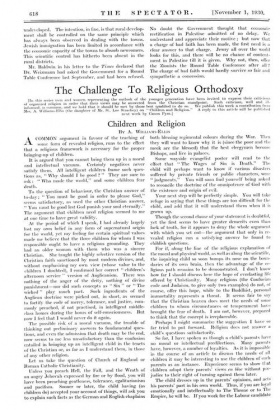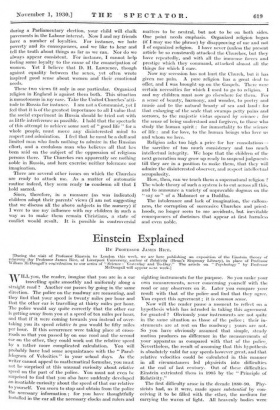The Challenge To Religious Orthodoxy
[In this series men and women representing the outlook of the younger generation have been invited to express their criticisms of organized religion in order that their views may be answered from the Christian standpoint. Such criticism, well and ill- informed. is common, and we bold that it should be met by those best qualified to do so. We publish this week a contribution from Mrs. A. Williams-Ellis (the daughter of Mr. St. Loe Strachey) on " Children and Religion." A reply to this article will be published next week by Canon Pym.I
Children and Religion
BY A. WILLIAMS-ELLIS ACOMMON argument in favour of the teaching of some form of revealed religion, runs to the effect that a religious framework is necessary for the proper bringing-up of children.
It is argued that you cannot bring them up in a moral and intellectual vacuum. Certainly negatives never satisfy them. All intelligent children frame such ques- tions as, " Why should I be good ? " They are sure to ask : " Who made the world," and some children fear death.
To the question of behaviour, the Christian answer of to-day ; " You must be good in order to please God," seems satisfactory, as used the other Christian answer, " You must be good lest God punish your soul eternally." The argument that children need religion seemed to me at one time to have great validity.
At the period of which I speak, I had already largely lost my own belief in any form of supernatural origin for the world, yet my feeling for certain spiritual values made me believe that the three children for whom I was responsible ought to have a religious grounding. They had an older woman with them who was a sincere Christian. She taught the highly selective version of the Christian faith sanctioned by most modern divines, and, without emphasizing my own view (whose value to the children I doubted), I confirmed her correct " children's afternoon service " version of Anglicanism. There was nothing of the anger of the deity, nothing of divine punishment—nor did such concepts as " Sin " or " The wicked " play much part. Such ingredients of the Anglican doctrine were picked out, in short, as seemed to fortify the code of mercy, tolerance, and justice, com- monly preached, if not practised, in intelligent middle- class homes during the hours of self-consciousness. But now I feel that I would never do it again.
The possible risk of a moral vacuum, the trouble of thinking out preliminary answers to fundamental ques- tions, and even the admission that death may be the end, now seems to me less unsatisfactory than the confusion entailed in bringing up an intelligent child in the tenets of the Christian or, as far as I understand them, in those of any other religion.
Let us take the question of Church of England or Roman Catholic Christianity.
Unless you preach Hell, the Fall, and the Wrath of an angry Jehovah expressed by fire or by flood, you will
have been preaching gentleness, tolerance, egalitarianism and pacifism. Sooner or later, the child. having (as children do) accepted your account of things, will ask you to explain such facts as the German and English chaplains
both blessing regimental colours during the War. Then they will want to know why it is (since the poor and the meek are the blessed) that the best clergymen become Bishops, and live in palaces.
Some wayside evangelist poster will read to the effect that " The Wages of Sin is Death." The child will perhaps want to know if various disasters suffered by private friends or public characters, were " judgments." You will soon find yourself being asked to reconcile the doctrine of the omnipotence of God with the existence and origin of evil.
Your next step will be perfectly simple. You will take refuge in saying that these things are too difficult for the child, and add that it will understand them when it is grown up.
Though the second clause of your statement is doubtful, yet the first seems to have greater demerits even than lack of truth, for it appears to deny the whole argument with which you set out—the argument that only in re- vealed religion can a satisfying answer be found to childish questions.
For if, along the line of the religious explanation of the moral and physical world, as well as along the scientific, the inquiring child so soon bumps its nose on the boun- daries of its own brain, then the advantage of the re- ligious path remains to be demonstrated. I don't know how far I should discuss here the hope of everlasting life
offered by Christianity. Many religions (the Confucian code and Judaism, to give only two examples) do not, of
course, offer this hope, while to the Buddhist, personal
immortality represents a threat. It seems fair to say that the Christian heaven does meet the needs of some
children to whom circumstances or temperament have brought the fear of death. I am not, however, prepared to think that the concept is irreplaceable.
Perhaps I might summarize the suggestion I have so far tried to put forward. Religion does not answer a child's questions satisfactorily.
So far, I have spoken as though a child's parents have no moral or intellectual predilections. Many parents have, however, a number of loyalties. As it is impossible in the course of an article to discuss the needs of all children it may be interesting to use the children of such parents as an instance. Experience seems to show that children adopt their parents' views en bloc without pre- judice to their right of turning against them later.
The child dresses up in the parents' opinions, and acts his parents' part in his own world. Thus, if you are loyal emotionally and intellectually to The Throne or to The Empire, he will be. If you work for the Labour candidate
during a Parliamentary election, your child will chalk pavements in the Labour interest. Now I and my friends have a number of loyalties. For instance, we hate poverty and its consequences, and we like to hear and tell the truth about things as far as we can. Nor do we always appear consistent. For instance, I cannot help feeling some loyalty to the cause of the emancipation of women. Yet I believe that D. H. Lawrence, though against equality between the sexes, yet often wrote inspired good sense about women and their emotional needs.
These two views fit only in one particular. Organized religion in England is against them both. This situation is monotonous in my case. Take the United Churches' atti- tude to Russia for instance. I am not a Communist, yet I feel that it is of the greatest importance to all I value that the social experiment in Russia should be tried out with as little interference as possible. I hold that the spectacle of this attempt to achieve some sort of " good life " for a whole people, must move any disinterested mind to respect and admiration. I feel that he must be a dull and limited man who finds nothing to admire in the Russian effort, and a credulous man who believes all that hos been said on the subject of the oppression of religious persons there. The Churches can apparently see nothing noble in Russia, and here exercise neither tolerance nor imagination.
There are several other issues on which the Churches are ready to attack me. As a matter of automatic routine indeed, they seem ready to condemn all that I hold sacred.
Since, therefore, in a measure (as was indicated) children adopt their parents' views (I am not suggesting that we discuss all the above subjects in the nursery) if I were to use ray influence with my children in such a way as to make them remain Christians, a state of conflict would result. It is possible in controversial matters to be neutral, but not to be on both sides. One point needs emphasis. Organized religion began (if I may use the phrase) by disapproving of me and not I of organized religion. I have never (unless the present article be so construed) attacked the Churches, but they have repeatedly, and with all the immense forces and prestige which they command, attacked almost all the things for which I care.
Now my secession has not hurt the Church, but it has given me pain. A pure religion has a great deal to offer, and I was brought up on the Gospels. There were certain necessities for which I used to go to religion. I and my children must now go elsewhere for them. For a sense of beauty, harmony, and wonder, to poetry and music and to the natural beauty of sea and land : for that enlarging of the scale that swamps petty pains and sorrows, to the majestic vistas opened by science : for the sense of being understood and forgiven, to those who study the human spirit : for immortality to the science of life : and for love, to the human beings who love us and whom we love.
Religion asks too high a price for her consolations— the sacrifice of too much consistency and too much intellectual integrity. We hope that the children of the next generation may grow up ready to suspend judgments till they are in a position to make them, that they will admire the disinterested observer, and respect intellectual scrupulosity.
How, then, can we teach them a supernatural religion ? The whole theory of such a system is to cut across all this, and to announce a variety of unprovable dogmas on the " say so " of a Mahomet or a Buddha.
The intolerance and lack of imagination, the callous. ness, the corruption of successive Churches and priest- hoods, no longer seem to me accidents, but inevitable consequences of doctrines that appear at first hamdess and even noble.











































 Previous page
Previous page